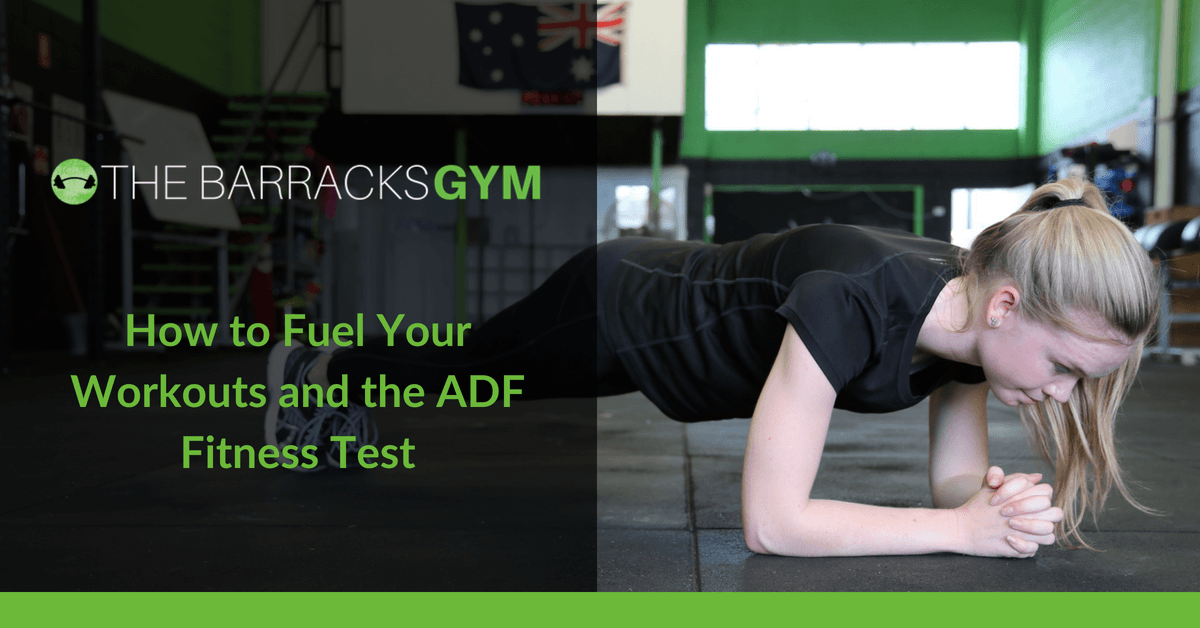|
Given the role they are required to perform, it is no surprise that ADF recruits have to demonstrate certain levels of fitness upon commencement of their training. Fitness requirements for the ADF are monitored with the use of a test known as the ADF Physical Fitness Assessment as you probably already know. Just as a reminder, the PFA comprises of three key elements: push-ups, sit-ups, and the beep test. The ADF fitness test is physically demanding, and focuses on strength, endurance and cardiovascular fitness. As well as monitoring fitness levels, it is also used to provide an indicator as to a trainee’s potential susceptibility to injury. If you are enlisting in the ADF, your PFA preparations need to be on point to hit the pass mark. An important element for being in top shape on your assessment many applicants forget is adequate nutrition. A balanced diet is key not only on your assessment day, but throughout your preparation to aid performance in the gym and better muscle recovery while you rest. Why to focus on your diet?uMany new recruits will focus on ensuring they are in prime physical condition to pass the ADF fitness test with ease. This, of course, is important: the hours you spend in the gym will ultimately decide how successful you are on testing day. However, there is a crucial component of training that is often overlooked: your nutritional requirements. When you are training hard, food is no longer just food - it’s fuel for your muscles and your organs. Just think about what would happen to your car if you run out of petrol. It stops. While our bodies are very efficient in metabolising nutrients for energy and thus running out requires a serious length of time without any food, if you put yourself through a badass workout without sufficient nutrients in your body to fuel that session, you risk your performance, getting injured and making any progress towards your goals. What not to doIf you’re planning on engaging in a training session for the ADF fitness test, then it goes without saying that you’re going to want to ensure you have plenty of energy. “What gives energy?” you’ll ask yourself, and your mind will immediately flick to the purest form of energy you can eat: sugar. So you decide to grab a coke and head to your workout session, expecting you’ll be feeling full of energy and able to train efficiently as a result of your selection. However, there is such a thing as useless nutritional energy, aka empty calories. The sugar in a coke can indeed make you feel more energetic temporarily, but the energy is not sustainable. Sugar is notorious for delivering a quick burst of energy and then causing reactive hypoglycemia - which is better known as a sugar crash. Essentially, you rush up the energy peak, and then you tumble into the valley. This means you’ll inevitably find yourself halfway through a workout and suddenly feel far more tired than you think you should. Other "bad" practices include junk foods and any food or beverage that is high in sugar or other refined carbs and contain little to no other nutrients; insufficient amount of protein in your diet in general, irregular size meals at irreglar times; too much alcohol the night before and heaps of processed meals in general. What to do insteadEducate yourself about food, the different types of nutrients, why you need them in what amount and what happens if you don't get enough of them. If you already know this then aim to follow the guidelines in your diet. Keep your portions under control, eat the right amount for your goals. If you feel you need to lose some weight, then focus on calorie deficit. Eat 3-4 meals a day at regular times and ensure they contain a good balance of whole proteins, carbohydrates, vegetables and a tiny amount of "good" fats. This will be the fundation you build on when it comes to accelerated performance. Nutrient timingWhen training for the ADF fitness test, it’s not just what you eat that matters: it’s when you eat. If the fundation of your diet is on point you may not need to worry about timing as your body should always have enough energy. However, when the demand is higher and you expect to be working out for a longer period of time or engage in heavy lifting, it's worth looking at the times you eat. If you only eat main meals, the ideal time between a meal and the workout is 2-3 hours before the workout, but feel free to eat as soon after as you feel hungry. Some people prefer snacking and that's great too. Feel free to have a smaller snack up to 90-60 minutes before session that is rich in protein and carbohydrates. Aim for fast absorbing light snacks, the last thing you want is a stuffed stomach while doing your sprints for instance. You can also play with your macronutrient ratios on rest and workout days, aiming for more carbs around tough workouts. Bottom LineThe better quality fuel you put in your body, the better performance you can expect both in your workout sessions and on your Physical Fitness Assessment for the ADF. Simple is the best, eat whole food most the times and aim for balance, then feel free to supplement with snacks around your workouts if needed.
Do you need guidance on how to get started with your training? Feel free to get in touch!
0 Comments
Leave a Reply. |
Most PopularTrusted PartnerWe work with the best service provider for Defence and First Responders.

Get SocialCategoriesArchives
January 2024
|
© COPYRIGHT 2024. ALL RIGHTS RESERVED.


 RSS Feed
RSS Feed